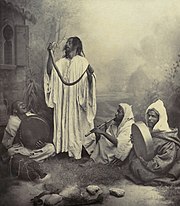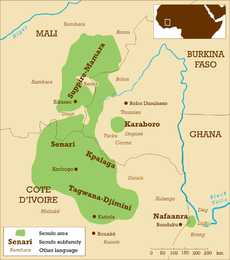Portal:Africa



Africa is the world's second-largest and second-most populous continent after Asia. At about 30.3 million km2 (11.7 million square miles) including adjacent islands, it covers 20% of Earth's land area and 6% of its total surface area. With nearly 1.4 billion people as of 2021, it accounts for about 18% of the world's human population. Africa's population is the youngest among all the continents; the median age in 2012 was 19.7, when the worldwide median age was 30.4. Based on 2024 projections, Africa's population will reach 3.8 billion people by 2099. Africa is the least wealthy inhabited continent per capita and second-least wealthy by total wealth, ahead of Oceania. Scholars have attributed this to different factors including geography, climate, corruption, colonialism, the Cold War, and neocolonialism. Despite this low concentration of wealth, recent economic expansion and a large and young population make Africa an important economic market in the broader global context. Africa has a large quantity of natural resources and food resources, including diamonds, sugar, salt, gold, iron, cobalt, uranium, copper, bauxite, silver, petroleum, natural gas, cocoa beans, and.
Africa straddles the equator and the prime meridian. It is the only continent to stretch from the northern temperate to the southern temperate zones. The majority of the continent and its countries are in the Northern Hemisphere, with a substantial portion and a number of countries in the Southern Hemisphere. Most of the continent lies in the tropics, except for a large part of Western Sahara, Algeria, Libya and Egypt, the northern tip of Mauritania, and the entire territories of Morocco, Ceuta, Melilla, and Tunisia, which in turn are located above the tropic of Cancer, in the northern temperate zone. In the other extreme of the continent, southern Namibia, southern Botswana, great parts of South Africa, the entire territories of Lesotho and Eswatini and the southern tips of Mozambique and Madagascar are located below the tropic of Capricorn, in the southern temperate zone.
Africa is highly biodiverse; it is the continent with the largest number of megafauna species, as it was least affected by the extinction of the Pleistocene megafauna. However, Africa also is heavily affected by a wide range of environmental issues, including desertification, deforestation, water scarcity, and pollution. These entrenched environmental concerns are expected to worsen as climate change impacts Africa. The UN Intergovernmental Panel on Climate Change has identified Africa as the continent most vulnerable to climate change.
The history of Africa is long, complex, and varied, and has often been under-appreciated by the global historical community. In African societies the oral word is revered, and they have generally recorded their history via oral tradition, which has led anthropologists to term them oral civilisations, contrasted with literate civilisations which pride the written word. During the colonial period, oral sources were deprecated by European historians, which gave them the impression Africa had no recorded history. African historiography became organized at the academic level in the mid-20th century, and saw a movement towards utilising oral sources in a multidisciplinary approach, culminating in the General History of Africa, edited by specialists from across the continent. (Full article...)
Selected article –
The Adar oilfield, also known as the Adar Yale, Adar Yeil or Adaril field, is an oilfield situated in the Melut in South Sudan estimated to contain about 276 million barrels (43,900,000 m3) of oil. The Chevron Corporation discovered the Adar Yale field in 1981, shortly before the start of the Second Sudanese Civil War (1983–2005). Soon after Chevron had suspended operations in 1984, Sudanese government troops began attacking civilian settlements in the area, burning the houses and driving the people away, and in the late 1990s, Nuer militias from Nasir helped the army in clearing away the people to make way for the roads and infrastructure of the oilfield.
President Omar al-Bashir inaugurated the site in March 1997, and it initially produced just 5,000 barrels (790 m3) a day. Production from this oilfield, which lies close to the borders with Sudan and Ethiopia, has the potential to bring significant economic benefits to the region. However, until recently the focus has been on clearing the population away from the oilfield rather than on a longer term strategy for developing the region. China has provided a large investment in the Adar oilfield and others in South Sudan and Sudan and has made plans to make extensive further investments. (Full article...)
Featured pictures –
Did you know (auto-generated) -

- ... that Erick Russell is the first openly gay African American elected to a statewide office in the United States?
- ... that South African physician Tlaleng Mofokeng is the United Nations special rapporteur on the right to health, and was named one of the BBC's 100 Women?
- ... that Dominion: An Anthology of Speculative Fiction From Africa and the African Diaspora was partly inspired by The 1619 Project?
- ... that South African anti-apartheid activist Ebrahim Ismail Ebrahim confused warders at the Robben Island maximum security prison by playing Bollywood music?
- ... that Alisha Kramer worked to fight HIV/AIDS, tuberculosis, and inequity in women's health in Africa and Europe as a program coordinator for the Center for Strategic and International Studies?
- ... that whilst serving as the Central African ambassador in Paris, Sylvestre Bangui held a press conference confirming that his government had massacred children and resigned?
Categories
Selected biography –
Rainilaiarivony (30 January 1828 – 17 July 1896) was a Malagasy politician who served as the prime minister of Madagascar from 1864 to 1895, succeeding his older brother Rainivoninahitriniony, who had held the post for thirteen years. His career mirrored that of his father Rainiharo, a renowned military man who became prime minister during the reign of Queen Ranavalona I.
Despite a childhood marked by ostracism from his family, as a young man Rainilaiarivony was elevated to a position of high authority and confidence in the royal court, serving alongside his father and brother. He co-led a critical military expedition with Rainivoninahitriniony at the age of 24 and was promoted to commander-in-chief of the army following the death of the queen in 1861. In that position he oversaw continuing efforts to maintain royal authority in the outlying regions of Madagascar and acted as adviser to his brother, who had been promoted to prime minister in 1852. He also influenced the transformation of the kingdom's government from an absolute monarchy to a constitutional one, in which power was shared between the sovereign and the prime minister. Rainilaiarivony and Queen Rasoherina worked together to depose Rainivoninahitriniony for his abuses of office in 1864. Taking his brother's place as prime minister, Rainilaiarivony remained in power as Madagascar's longest-serving prime minister for the next 31 years by marrying three queens in succession: Rasoherina, Ranavalona II and Ranavalona III. (Full article...)
Selected country –
 |
 |
||

| |||
Namibia, officially the Republic of Namibia, is a country in southern Africa on the Atlantic coast. It shares borders with Angola and Zambia to the north, Botswana to the east, and South Africa to the south. It gained independence from South Africa in 1990 and its capital city is Windhoek (German: Windhuk). It is divided into 13 regions and subdivided into 102 constituencies. Namibia is a member state of the United Nations (UN), the Southern African Development Community (SADC), the African Union (AU), and the Commonwealth of Nations.
The politics of Namibia takes place in a framework of a presidential representative democratic republic, whereby the President of Namibia is elected to a five year term and is both the head of state and the head of government, and of a multi-party system. Executive power is exercised by the government. Legislative power is vested in both the government and the two chambers of parliament. The Judiciary is independent of the executive and the legislature. (Read more...)
Selected city –
Cape Coast is a city, a fishing port, and the capital of Cape Coast Metropolitan District in the Central Region of Ghana. It is one of the country's most historic cities, a World Heritage Site, and home to the Cape Coast Castle, with the Gulf of Guinea situated to its south. It was also the first capital of Ghana. According to the 2021 census, Cape Coast had a settlement population of 189,925 people. The language of the people of Cape Coast is Fante.
The older traditional names of the city are Oguaa and Kotokuraba (meaning "River of Crabs" or "Village of Crabs"). The Portuguese navigators João de Santarém and Pedro Escobar who sailed past Oguaa in 1471 designated the place Cabo Corso (meaning "short cape"), from which the name Cape Coast derives. From the 16th century to the country's independence in 1957, the city changed hands between the British, the Portuguese, the Swedish, the Danish and the Dutch. It is home to 32 festivals and celebrations. (Full article...)
In the news
- 12 February 2024 –
- Two boats collide on the Congo River near Kinshasa, Democratic Republic of the Congo; with the death toll remains unclear. (AP)
- 11 February 2024 – 2023 Africa Cup of Nations
- In association football, hosts Ivory Coast win their third Africa Cup of Nations by defeating Nigeria 2–1 in the final. Sébastien Haller scores the winning goal in the 81st minute. (The Guardian)
- 10 February 2024 – Somali civil war
- Four Emirati soldiers and a Bahraini military officer are killed, while ten other people are injured, when a soldier opens fire at a military base in Mogadishu, Somalia, before being killed in the ensuing shootout. Al-Shabaab claims responsibility. (AP)
- 10 February 2024 –
- A Eurocopter EC130 helicopter crashes near Nipton, California, United States, killing all the six people on board, including Nigerian banker Herbert Wigwe. (CBS News)
- 10 February 2024 – 2023–2024 Senegalese protests
- Violent protests occur in Senegal following an announcement by President Macky Sall that presidential elections have been delayed from February 25 to December 15. (Sky News)
- 9 February 2024 –
- At least 18 people are killed during a collision between a bus and a truck on a road in Kinshasa, Democratic Republic of the Congo. (AP)
Updated: 16:33, 14 February 2024
General images -
Africa topics
More did you know –
- ...that members of the Senegalese rap group Daara J were hired by campaigners in the Senegalese election of 2000 to edit their speeches?
- ...that Senegalese hip hop group Positive Black Soul's name abbreviation, PBS, is a play on that of the Parti Démocratique Sénégalais, PDS?
- ...that Mamadou Diabaté, a Malian kora player, was nominated for a Grammy Award in 2005, but lost to his cousin Toumani Diabaté?
- ...that, in November 2007, The Sowetan published an article which erroneously claimed that South African political activist Dan Mokonyane had died?
Related portals
Major Religions in Africa
North Africa
West Africa
Central Africa
East Africa
Southern Africa
Associated Wikimedia
The following Wikimedia Foundation sister projects provide more on this subject:
-
Commons
Free media repository -
Wikibooks
Free textbooks and manuals -
Wikidata
Free knowledge base -
Wikinews
Free-content news -
Wikiquote
Collection of quotations -
Wikisource
Free-content library -
Wikispecies
Directory of species -
Wikiversity
Free learning tools -
Wikivoyage
Free travel guide -
Wiktionary
Dictionary and thesaurus

























































































